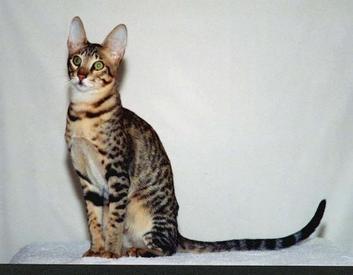
Wanting to develop a breed that closely resembled the wild African serval without actually incorporating one into the gene pool, conservation biologist, Karen Sausman, selectively bred an Oriental Shorthair and a Bengal to achieve the desired result. This breeding produced a graceful, leopard-like cat with unique markings and an amiable temperament. The Serengeti is often compared to the Savannah – a breed that is usually sired by an African serval, although the Serengeti combines no wild blood. Instead it boasts the physicality of a wild cat that has only recently emerged. The Serengeti was first created in 1994 and was registered by the International Cat Association as a ‘developing breed.’
The Serengeti is a medium to large-sized breed with several distinctive traits. Its large-boned structure is lithe and elegant; the cat boasts long legs, a long body, large, round-tipped ears, a small, triangular face and bold eyes. The coat is typically short, glossy and close-fitting, and can be easily maintained with regular grooming. As far as coat patterning goes, the Serengeti is one of the most decorated cats, with rich gold colouring and black spots spaced widely apart. Generally speaking, the hair is marginally lighter on the stomach, face and throat. The Serengeti possesses keen instincts and is capable of climbing to great heights.
Unlike the Savannah, the Serengeti contains no wild blood. For this reason, many consider it a more amiable breed that is better suited to domestic living. Personality traits (as described by breeders, owners and enthusiasts alike) include friendliness, patience, and self-confidence. The Serengeti forms strong attachments to its people and displays love, loyalty and affection to its special few. Most owners keep their Serengeti as indoor-only cats because of their rarity, but it is important to provide a variety of interactive toys and playthings, as well as ensuring plenty of human companionship, to mentally stimulate your cat throughout the day. Boredom will often translate through destructive behaviours in the home and because the Serengeti is highly active, it is essential to keep it occupied. On average, a healthy Serengeti will weigh 8-12 pounds depending on gender, with a life expectancy of 15 years.
Because domestic Serengeti are few and far between, determining genetic or breed-specific health conditions is difficult. Many describe the breed as having ‘hybrid vigour’ and being both healthy and long-lived.
Do you own a Serengeti cat? Let others know what they're like!
Related products
Advantage 80 Spot On Flea Control Large Cats and Rabbits
from £10.89
Advantage 40 Spot On Flea Control Cats, Small Dogs and Rabbits
from £10.89
Advantage 100 Spot On Flea Control Medium Dog
from £10.89
Advantage 250 Spot On Flea Control Large Dog
from £10.89
Drontal Tasty Bone Wormer Tablets for Small & Medium Dogs (2 to 20kg)
from £1.83
FRONTLINE Plus Flea & Tick Treatment Dogs & Cats
from £17.49
TermaWorm™ Tablets for Cats & Dogs
from £1.59
Drontal Tasty Bone XL Wormer Tablets for Large Dogs (Over 20kg)
from £5.43